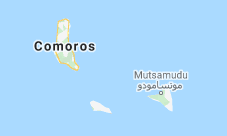
Comoros

Brief Overview
The archipelago of the Comoros is located in the Indian Ocean, north of the Mozambique Channel and northeast of Madagascar.
Political Context
After being absent from the political scene for 10 years, Azali Assoumani won the 2016 presidential elections. His Government introduced a series of fiscal and structural reforms. The national congress, convened in February 2018 to assess conditions after 42 years of independence, recommended an overhaul of the system of a rotating presidency among the islands. The yes vote in the July 2018-referendum on constitutional reform that expands the power of the presidency means that it is likely that presidential elections will be held ahead of schedule in 2019.
Economic Overview
Despite the political uncertainty related to the referendum and early elections, economic growth remained steady at 2.8% in 2018, as the reliability of the electricity supply improved and the telecoms sector grew more competitive. Lending to the private sector, however, was sluggish, growing by only 5.1% in 2018. This can be attributed to the problems of the financial sector, which is coping with large numbers of non-performing loans, a shortage of bank liquidity and governance problems at the Government-owned Postal Bank (Société nationale des postes et services financiers SNPSF).
Real GDP growth should reach an average of 3.2% between 2019 and 2021, on the strength of public investment in infrastructure projects, such as road improvements and the reconstruction of El-Maarouf hospital. Growth will also be boosted by the tourism industry and the telecoms sector, with the arrival of a very high speed submarine cable in Moroni. Remittances from the diaspora will remain the main support for private consumption.
However, increasing government debt to fund major infrastructure projects could hamper the Government’s capacity to service its debt, especially non-concessional loans. The Government is already finding it difficult to meet its payroll and pay for its purchases of goods and services. It is also falling into arrears on its external debt. The Postal Bank’s fragile financial situation could also take a sudden turn for the worse and have a significant impact on public finances. The economic consequences of the presidential elections are still unclear and they could involve slower economic growth in the future.

The Union of the Comoros
Capital: Moroni
Population 813,000
Area 1,862 sq km (719 sq miles)
Major languages Arabic, French, Comoran (a blend of Swahili and Arabic)
Major religion Islam
Life expectancy 62 years (men), 65 years (women)
Currency Comoran franc
UN, World Bank

Social Context
The Comoros is densely populated, with approximately 400 inhabitants per km2, and more than half of the population (53%) is under the age of 20.
According to the last household survey conducted in 2014, almost 18% of the population lives below the international poverty line set at $1.9 per capita per day. The incidence of poverty, which varies considerably from one island to another, seems highest in rural areas and on the island of Mohéli. There is considerable inequality, with a Gini index of 44.9.
Development Challenges
The Comoros, which was ranked 158 (out of 188) on the U.N.’s Human Development Index in 2016, must focus its efforts on combating hunger and malnutrition.
In 2012, almost 30% of children under the age of five suffered from chronic malnutrition and stunted growth.
Furthermore, infant mortality remains high, with a rate of 69 per 1,000 births for children under the age of one and 52.2 per 1,000 births for children under the age of five, recorded in 2017.
The maternal mortality rate in 2015 was 335 per 100,000 births.
Physical Contacts of the Presidency
Name of Minister:
Address:
Telephone:
Fax:
Physical Contacts of the Prime Minister’s Office
Name of Minister:
Address:
Telephone:
Fax:
Physical Contacts of the National Assembly
Name of Speaker of the House:
Address:
Telephone:
Fax:
Physical Contacts of the Chief Of State and Cabinet Ministers
Name of Minister:
Address:
Telephone:
Fax:
Physical Contacts of the Ministry of Interior
Name of Minister:
Address:
Telephone:
Fax
Physical Contacts of the Ministry of Justice
Name of Minister:
Address:
Telephone:
Fax:
Physical Contacts of the Ministry of Foreign Affairs
Name of Minister:
Address:
Telephone:
Fax:
Physical Contacts of the Ministry of Women’s Affairs
Name of Minister:
Address:
Telephone:
Fax:
Physical Contacts of the National Human Rights Commission
Name of Minister:
Address:
Telephone:
Fax:
Physical Contacts of the Police
Name of Inspector General:
Address:
Telephone:
Fax:
Physical Contacts of the Military
Name of Inspector General:
Address:
Telephone:
Fax:
Important Information of Key Human Rights Issues in Comoros
Number Prisons in Comoros
Number Prisoners in Comoros
Secret Detention Centres:
Police Stations in Comoros
What are the current and ongoing human rights issues in Comoros
(1) Freedom of the Press
(2) Human Rights Defenders Issues
(3) Impunity
African Union (AU)
Joined the OAU
Signed the Constitutive Act of The African Union on:
Ratified:Instrument Deposited:
Signed:
Ratified:
Instrument Deposited:
Signed:
Ratified:
Instrument Deposited:
Signed: –
Ratified: –
Instrument Deposited: –
4.Protocol on Amendments to the Protocol on the Statute of the African Court of Justice and Human Rights
Signed: –
Ratified: –
Instrument Deposited: –
Signed: –
Ratified: –
Instrument Deposited: –
Signed: –
Ratified: –
Instrument Deposited: –
Signed: –
Ratified: –
Instrument Deposited: –
Signed: –
Ratified: –
Instrument Deposited: –
Signed: –
Ratified: –
Instrument Deposited: –
Signed: –
Ratified: –
Instrument Deposited: –
Signed: –
Ratified: –
Instrument Deposited: –
Signed: –
Ratified: –
Instrument Deposited: –
Signed: –
Ratified: –
Instrument Deposited: –
Signed: –
Ratified: –
Instrument Deposited: –